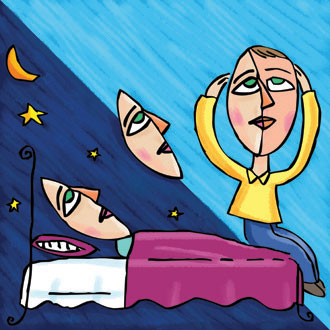Forty Winks May Be Hard After Trauma
Nightmares and hyper-vigilance ruin the sleep of many trauma survivors. Thanks to two Tulane-affiliated psychologists, survivors of traumatic experiences now have a new tool to help them and their loved ones get a good night's sleep.

“Sleep disturbance is a common problem for traumatized individuals,” says Karin E. Thompson, co-author of an insomnia workbook who is a clinical faculty member in psychiatry at Tulane. (Illustration by Kenneth Harrison)
Karin E. Thompson and C. Laurel Franklin, clinical faculty members in the Department of Psychiatry and Behavioral Sciences, co-wrote The Post-Traumatic Insomnia Workbook based on their experience working with trauma survivors, including veterans in the Veterans Health Administration system.
“Sleep disturbance is a common problem for traumatized individuals,” says Thompson, many of whose clients have post-traumatic stress disorder. “I quickly realized how disruptive and distressing not being able to sleep is, and I started researching it.”
She and her colleagues had developed a cognitive-behavioral approach to improving sleep quality that was working for clients. Cognitive-behavioral strategies involved changing thought patterns and behaviors that may be preventing sleep.
After trauma, many people experience a “heightened state of arousal or psychological and physical tension,” says Thompson. This tension may ease over time, but insomnia remains.
“Sleep problems may be because people are unwittingly engaging in thoughts and behaviors that perpetuate their sleep problems,” she says.
Worrying about sleep won't help.
“If the problem is trauma-related insomnia, one of the most important things people can do is avoid giving their sleep too much importance.”
The workbook (New Harbinger, 2010), takes survivors through the steps of cataloguing their sleep problems, keeping a sleep log, and developing strategies to improve sleep, such as scheduling sleep times and only sleeping in the bedroom.
Medical conditions and medications also cause insomnia, so Thompson advises checking in with a healthcare provider in addition to using the workbook.
Thompson and Franklin are continuing to work with veterans and other clients who have trauma-related sleep disturbance. They are currently investigating whether similar strategies can be used in groups or through sessions provided via telecommunication.
Madeline Vann is a freelance writer who holds a master of public health degree from Tulane.
